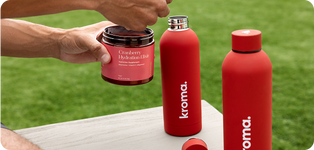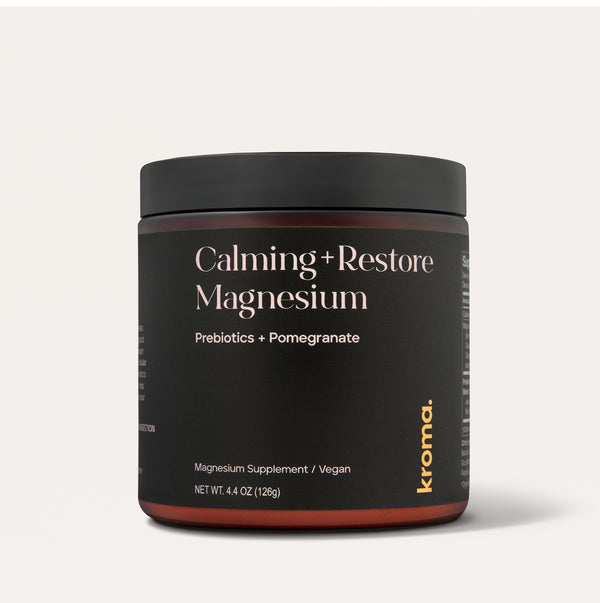Your thoughts feed your gut. Your gut feeds your brain. This isn't metaphorical, it's literal, measurable science happening in your body right now.
The gut-brain connection runs on a two-way highway called the vagus nerve, and what travels back and forth on this highway determines everything from your mood and energy to your ability to handle stress and think clearly.
How Your Thoughts Feed Your Gut
Every thought you think creates a cascade of chemical reactions in your body. Chronic stress, anxiety, and negative thought patterns trigger the release of cortisol and other stress hormones that directly damage your gut lining and disrupt your microbiome.
When you're constantly in fight-or-flight mode, whether from real danger or perceived threats like work stress, social media, or endless mental loops your digestive system essentially shuts down. Blood flow gets redirected away from digestion, stomach acid production decreases, and the delicate balance of gut bacteria gets thrown off.
This is why you might notice digestive issues during stressful periods, or why anxiety often shows up as a "gut feeling." Your gut is literally responding to your mental state.
How Nutrition Shapes Your Gut Health
By now, you probably know that what you eat directly determines the health of your gut-and by extension, your brain. Your gut microbiome is essentially an ecosystem, and like any ecosystem, it thrives or struggles based on what you feed it.
Processed foods, sugar, and artificial additives feed harmful bacteria and create inflammation in the gut lining. This leads to increased intestinal permeability (leaky gut), where toxins and undigested food particles slip into your bloodstream, triggering immune responses that show up as brain fog, mood swings, and chronic fatigue.
Fiber-rich whole foods feed beneficial bacteria, helping them multiply and strengthen your gut barrier. These good bacteria produce short-chain fatty acids that reduce inflammation and support the gut lining's integrity.
Timing and consistency also matter. Irregular eating patterns disrupt your gut's natural rhythms, while eating late at night interferes with the gut's repair processes that happen during sleep.
The Standard American Diet, high in processed foods, low in fiber, heavy on sugar, creates a gut environment where harmful bacteria flourish while beneficial bacteria struggle to survive. This imbalanced microbiome directly impacts your brain chemistry.
How Your Gut Feeds Your Brain
Here's where it gets really interesting: your gut produces about 95% of your body's serotonin (the neurotransmitter responsible for mood, sleep, and that general sense of wellbeing). A compromised gut means compromised serotonin production, which shows up as depression, anxiety, sleep issues, and mood swings.
Your gut bacteria also produce other neurotransmitters like GABA (which helps you feel calm) and dopamine (which drives motivation and pleasure). When your microbiome is out of balance, your brain chemistry follows suit.
This is why gut health and mental health are so deeply intertwined. You can't have one without the other.
Thoughts That Heal Your Gut
Ready to start thinking your way to a healthier gut? Here are some top science-backed ways:
Gratitude Practices Research shows that gratitude literally changes your brain chemistry and reduces inflammation throughout your body, including your gut. Try writing down three specific things you're grateful for each morning - simple, but effective.
Mindful Eating Eating in a calm, present state activates your parasympathetic nervous system (rest and digest mode), which optimizes digestion and nutrient absorption. Put your phone away, chew slowly, and actually taste your food.
Stress Reframing Instead of trying to eliminate stress (impossible!), practice reframing it as information rather than emergency. Ask: "What is this stress trying to tell me?" This shifts you from reaction to response.
Self-Compassion The way you talk to yourself directly impacts your stress hormones. Practice speaking to yourself with the same kindness you'd show a good friend.
Nutrients That Heal Your Gut
Now that you understand how nutrition shapes your gut ecosystem, here are the key nutrients that actively support gut healing and repair:
Fiber (Prebiotics) Feed the good bacteria in your gut with fiber-rich foods like garlic, onions, bananas, artichokes, and asparagus. These prebiotic fibers help beneficial bacteria multiply and produce those healing short-chain fatty acids.
Fermented Foods (Probiotics) Kimchi, sauerkraut, kefir, and other fermented foods introduce beneficial bacteria directly to your gut. Start small; too much too fast can cause digestive upset as your microbiome adjusts.
Anti-Inflammatory Compounds Omega-3 fatty acids from fatty fish, walnuts, and flax seeds help reduce gut inflammation. Turmeric, ginger, and green tea also provide powerful anti-inflammatory support.
Gut-Healing Proteins Bone broth provides collagen and amino acids like glycine that help repair the gut lining. Plant-based options include hemp seeds and pumpkin seeds for their healing amino acid profiles.
Lactoferrin This powerful protein supports gut barrier integrity and immune function while helping regulate iron absorption. Human-identical lactoferrin (found in Super Core) provides superior potency and bioavailability compared to bovine sources.
Zinc and L-Glutamine These nutrients are essential for gut lining repair. Zinc is found in pumpkin seeds, oysters, and grass-fed beef. L-glutamine is abundant in bone broth and can also be taken as a supplement.
The Kroma Connection
This is exactly why we formulated Super Core with effera, human-identical lactoferrin that supports both gut health and brain function. When your gut barrier is strong and your microbiome is balanced, your brain gets the steady supply of nutrients and neurotransmitters it needs to function optimally.
The Practice
Feed your gut-brain connection from both directions:
-
Start your day with a few minutes of gratitude or positive intention-setting
-
Eat one meal a day in complete presence-no phone, no TV, just you and your food
-
Incorporate one scoop a day of Super Core into your routine
-
Include gut-supporting nutrients in your daily routine
-
End your day by reflecting on what went well, not just what went wrong
Your gut and your brain are partners in your wellbeing. When you support one, you support the other. When you support both, you create the foundation for steady energy, stable mood, and resilient health.









